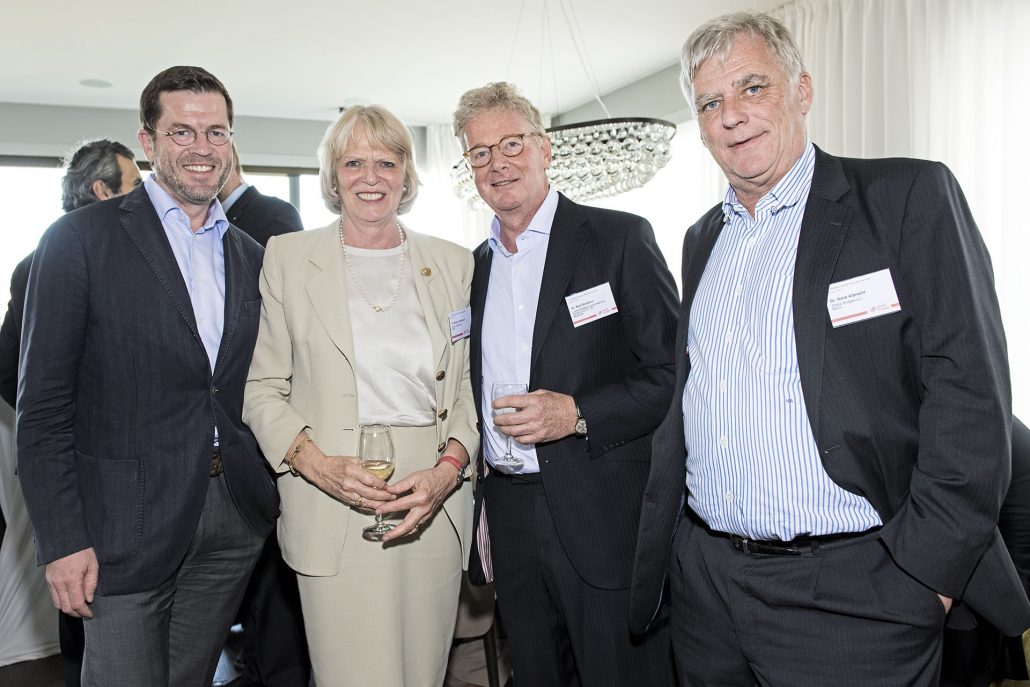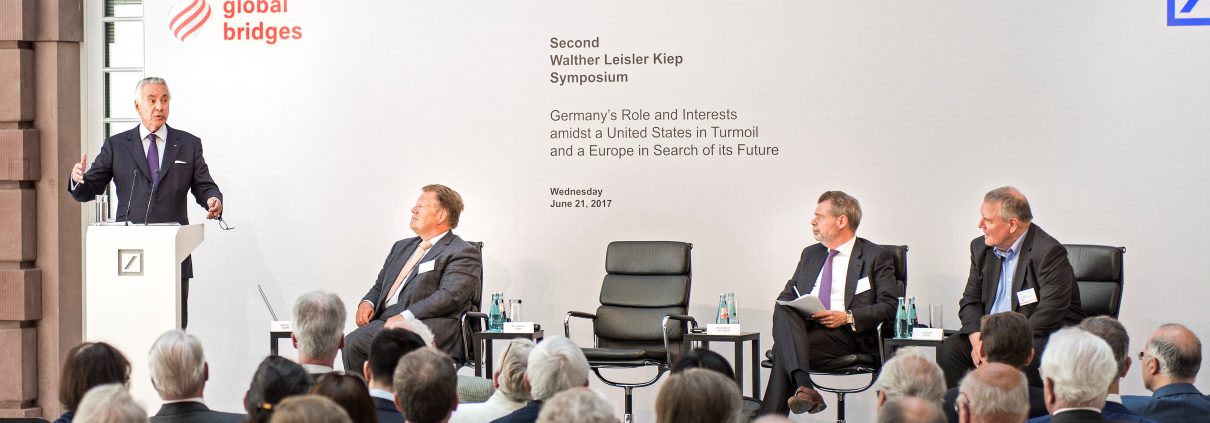II Walther Leisler Kiep Symposium 2017
Germany’s Role and Interests amidst a United States in Turmoil and a Europe in Search of its Future
Berlin, Germany
June 20-21, 2017
At the Second Walther Leisler Kiep Symposium Globalization and Protectionism, the Atlantic Community, and Germany’s Role in Europe were the topics in focus.
The results of the panel discussions may be summarized as follows:
New uncertainties are arising in a rapidly changing international arena due to growing opposition to global free trade, digitalization and its ramifications for the working world, and disputes over the consequences of energy supply and climate change.
Through Globalization, people are growing closer, but this also means that they are becoming more acutely aware of their differences. We should refrain from imposing our notions of democracy and human rights on the rest of the world and instead approach developmental assistance in a more pragmatic manner. Globalization has divergent consequences for the income and wealth distribution for western-oriented democracies.
Despite substantial unpredictability from the Trump administration, we must keep our transatlantic alliance strong and maintain mutual understanding, especially towards those who support President Trump. America’s opposition to North Stream is directed not only against Russia, but Germany as well. This should be clearly addressed.
Europe will have to step up their efforts to control deviating tendencies. The EU must do more to be taken seriously as a security provider. There was a call to observe the Maastricht Treaty: EU-minister of finance, fiscal union, economic government, perhaps even EU-led armed forces as well as a monitoring regime on the external borders and a balanced immigration and refugee policy. With Brexit, Germany’s interests are aimed at keeping the United Kingdom as close as possible to the EU, albeit without weakening the fundamental principles of the domestic market. In questions of security, continued cooperation is indispensable.
To read the full report by Dr. Rudolf Georg Adam, please click here:
Report by Dr. Rudolf Georg Adam
For the Second Walther Leisler Kiep-Symposium Global Bridges convened around one hundred friends and supporters in order to honour a magnanimous friend, whose scintillating, youthful wit and engaging charm remain unforgotten.
The programme consisted of an introductory key note presentation by Matthias Machnig, (State Secretary, Ministry of Economics and Energy) on Shaping Globalization, four panels on Free Trade or Protectionism?, The Future of the Atlantic Community, The New Global Competition and Germany’s Future amidst a Europe in Disarray. Karl-Theodor zu Guttenberg (Spitzberg Partners) concluded as Guest Speaker with remarks on Transatlantic Challenges off the Beaten Track.
Shaping Globalization
Matthias Machnig
We live in rapidly and profoundly changing circumstances. Economic and technological innovation produces a steady flow of new challenges and causes the centers of global economic activity to float permanently at accelerating pace. Beliefs that have guided our assumptions about economics are beginning to shift. The firm belief in free markets is coming under attack, globalization is being seen skeptically if not negatively. The decision of the United Kingdom to leave the European Union (Brexit) is the first major reversal of a trend that many believed to be irreversible: The permanent growth of the European Union and its irresistible tendency towards deeper integration. Populist movements are gathering support, democratic principles are coming under attack, the belief in democratic principles is being tested, globally there is a reverse current, exemplified by Turkey, Venezuela and the Philippines. Given these tendencies, what are the agenda for the next years?
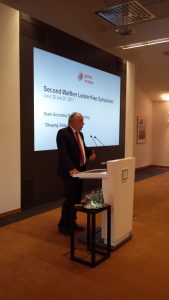
These agenda revolve around three main topics:
– digitalization
– trade
– energy/climate
All three require more international cooperation, not less. Today, as during the last decades, global security and the fate of the global economy is very much ankered in the USA. June 21st marks the 70th anniversary of the European Recovery Plan (ERP, Marshall Plan) which stood at the beginning of remarkable, unprecedented growth that has characterized those seven decades.
Today, the USA no longer supports free markets and free global trade. It has pulled out of the Paris Agreement on climate change. So far, this has been not more than an announcement. The coming years will show what consequences this announcement will trigger. Climate change is but the most obvious question which demands a collective response, not national approaches. Wilbur Ross has recently underlined the national focus in the new US-administration. For him, the most urgent question is how to engage China. Within the G20 (next summit in Hamburg is imminent), there is broad agreement on digitalization, but so far little on trade and energy/climate. In a remarkable reversal of positions President Xi Jinping of China has recently assumed the role of spokesman for free trade and global liberalism in Davos. The big question now is, whether China will honour these high sounding words with constant deeds. So far, China is still far from practicing what President Xi promised to persuasively in Davos.
The present problem has its roots in divergent approaches to economics and trade. The new administration in Washington blames bad trade deals as the source for trade imbalances and soaring deficits. The problem goes deeper, however. Manufacturing and industrial production account only for 10% of the US-economy. In Germany this sector accounts for 24% of GDP. A large share of that industrial production comes from foreign investment. The largest car exporter from the USA is BMW. The problem is not trade barriers or unfair competition but lack of skilled and appropriately qualified labour. The professional qualifications of an average US-worker is far below those of his European, particularly his German colleague. The educational system in the USA cares little for those who do not go to university.
On the other hand, there are obvious deficits on the German side. Investment is far too low. Germany has neglected investment in public infrastructure. Investment has to become more attractive, we have to create better incentives and a better framework. Germany has to raise incomes to create more purchasing power which will translate in higher consumption and consequently in lower exports and higher imports.
We have to seek a common position on Russia and Iran. Both are examples of how politics shapes the conditions for trade and how trade in reverse influences politics. Willy Brandt’s Ostpolitik had exactly this mutual correlation in mind (Wandel durch Handel and Wandel durch Annäherung). TTIP had not only economic functions. It was also an instrument to set rules and standards, which are essentially political instruments at a time when there is a general lack of such rules.
Instead of TTIP the EU has launched a new offensive on bilateral trade agreements: Japan, Mexico, Mercosur.
Climate change is not only about greenhouse gases and new burdens on energy production. It is an important driver for technological competitiveness. Energy strategies have to be acceptable in the long run. New technologies may mean higher costs. The present oil price is extremely low and it would be foolish to expect that it remains so low for the future. On the contrary, it seems safe to assume that it will go up rather steeply. The question is only when and how far.
What we need for a stable, flourishing world economy is better understanding, more cooperation, global bridges. We may differ on single questions, but we should seek common ground on principles and on common goals. We need compatibility, not necessarily congruity of views. The present situation cannot endure. At Taormina we had a configuration of 6:1. We cannot afford to conclude the G20-summit with an outcome of 19:1.
For Germany that means above all keeping the EU-partners together – today still 27, soon only 26. A German strategy that gives priority to investments and higher incomes will translate immediately in a boost for neighbouring economies which are closely intertwined with the German one. Countries currently under pressure will feel relief. German experiences of 2003/4 have shown that you cannot expect to redress deep structural deficiencies while at the same time observing the strict Maastricht criteria. We should show understanding for partners who face the same dilemma.
The trade indicators for the USA are worrisome: 350 bn US$ annual deficit with China, 200 bn US$ with the EU. The recent elections in France have provided new opportunities and impulses. We can restart the German-French engine for Europe. 2018 will be a crucial year for this. In 2019 we face elections for the European Parliament and negotiations about a new financial framework for the EU. So we will have to use the coming year to achieve a structural breakthrough in the economic and currency union, in banking union, and in the general level of EU-integration (European Minister of Finance, European Monetary Fund, EU-Investment Fund). We do not necessarily have to achieve this simultaneously at the level of 27. The most obvious option would be a German-French initiative for an integrated digital market. We will have to overcome the discrepancy between individual and common interests. With our new partners in Paris we have a new chance to make decisive headway on this.
Free Trade or Protectionism?
Henning Vöpel
Globalization has resulted in a progressive integration of emerging economies into the world economy. As a result, labour has become abundant, capital much more mobile. Today, components can be produced in any corner of the world, transportation costs have constantly fallen. This has favoured huge economies of scale. Productivity has increased, welfare has gone up. Increased trade, however, triggers distributional problems. Abundance of labour leads to an equalization of economic indicators, but only on a macro level. Whereas equality has increased on a global collective scale, inequalities have increased  on a national, individual scale. Within nations, discrepancies grow. Economic benefits are unequally distributed. Particularly the middle classes are disillusioned and lose faith in the benefits of globalization. For them, the economic benefits are less significant than the serious distributional dislocations. The question therefore is: How should we deal with distributional effects on the national level which the economic effects of globalization produce on the global level? It seems difficult to reconcile globalization, national coherence and democratic institutions. We have to rebalance therefore the economic benefits of globalization with their effects on national sovereignty, social systems and national voting systems. The credibility of global institutions is decreasing, their capacity to create legitimacy is waning. If you want to preserve democracy you may have to face some unpleasant choices like moderating or even arresting further moves towards more global integration. What is certain, however, is the necessity to improve and strengthen our capacity to cooperate on a multilateral level in order to find universally acceptable solutions to this dilemma.
on a national, individual scale. Within nations, discrepancies grow. Economic benefits are unequally distributed. Particularly the middle classes are disillusioned and lose faith in the benefits of globalization. For them, the economic benefits are less significant than the serious distributional dislocations. The question therefore is: How should we deal with distributional effects on the national level which the economic effects of globalization produce on the global level? It seems difficult to reconcile globalization, national coherence and democratic institutions. We have to rebalance therefore the economic benefits of globalization with their effects on national sovereignty, social systems and national voting systems. The credibility of global institutions is decreasing, their capacity to create legitimacy is waning. If you want to preserve democracy you may have to face some unpleasant choices like moderating or even arresting further moves towards more global integration. What is certain, however, is the necessity to improve and strengthen our capacity to cooperate on a multilateral level in order to find universally acceptable solutions to this dilemma.
Jürgen Fitschen
1. Global trade has suffered some disastrous setbacks recently. It has lost some essential tools for effective governance. CETA has almost been killed, TTIP is moribund. You need effective governance for international trade to create legitimacy and calculability. Increasing bilateralization is no substitute. Particularly small companies need such a framework, because they do not have the resources to find their way in a jungle of incoherent rules. Big companies can adapt much more easily because they can afford the manpower and expertise to navigate in largely uncharted waters. For the future, there is small room for comprehensive global trade agreements. We have to be less ambitious. Issues of culture and media should be kept separate.
2. Globalization is increasingly being blamed for all sorts of problems. It is perceived as benefiting only a small elite of globally networking superrich, not the ordinary man in the street. Globalization loses support in the media and among many voters. What can we do, what do we have to do, to convince more people that globalization is really benefitting all, even if in different degrees?

3. The present drive to scrutinize banks and hold them responsible for discovering and preventing all sorts of monetary crimes like tax evasion, money laundering, black money and corruption, creates the risk of stalling international banking altogether. Banks cannot act as policemen. With so many participants operating under so many completely different regulatory systems, it is impossible to identify the background of each single transaction. To be too rigorous could mean that entire countries might be completely shut out of global monetary flows.
4. A new type of global company has sprung up that tends to offer all the services that a global presence requires. Ali Baba and Amazon show the way. They offer to take care of capital requirements, of distribution, customer services and collecting the money. You do not have to have your own global presence, they offer virtual global presence – at much lower cost. The modern digital world poses a threat to conventional structures of distribution and customer relations. It also poses new dangers of monopolistic structures that could affect the balance between producer and distributor.
5. Global tax compatibility is an urgent and perennial problem. Present capabilities for collecting taxes are evidently insufficient. They exist only on a national level and open many loopholes for evasion. Global companies enjoy opportunities to shift and minimize their tax burden that small local companies can never aspire to. This not only robs governments of revenues they are entitles to, it also affects the competitive conditions between small and big business. A lot of creative thinking has to go into this question.
Discussion
Is there an alternative to globalization and free trade? How can the rebalancing that Henning Vöpel called for be achieved? What are the prospects for global governance? It seems obvious that climate change, migration and the free flow of information in the digital economy have increased the need for some form of global governance. Realistically, however, the prospects for such a global agreement have diminished, particularly with the new US-administration. Can we organize democracy on a supranational level? Will that be a way to provide an enduring answer? The European experience has shown, that this is extremely difficult, even on a regional level with relatively homogeneous states. On a global level, heterogeneity makes such a proposal highly unrealistic. The alternative is: Deeper, faster and more comprehensive global integration in the wake of TTIP or emphasis on national autonomy and sovereignty and a slow-down of further globalization projects. If democracy remains essentially a national affair, so should economic affairs remain essentially under national governance. This may come with serious losses of efficiency, but they may be the price we have to pay for more legitimacy. Do we have to increase global mobility? Or should we restrict it? Criticism of globalization comes both from the far left and the far right. But to keep the economy national would result in chaos and catastrophic losses in welfare.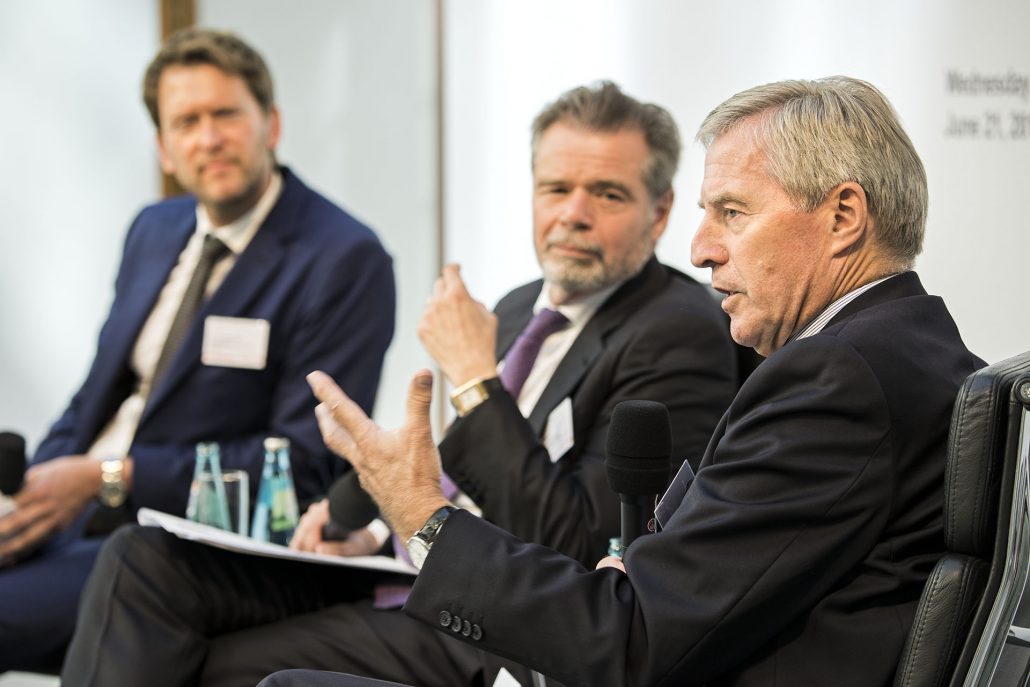
The population in Europe is shrinking. Demographic trends show a decline in human resources. Renationalisation would mean balkanisation. Instead of closing in, we should reach out and assist others to reach the level of competitiveness that we have reached. Of course, differences in lifestyle will persist. If you enjoy a different working culture with more leisure and more hedonistic pursuits, that is fine as long as the economic consequences are not suppressed. Different preferences will be reflected in different competitiveness and different income levels. Fairness is not egalitarianism. Fairness means that different efforts carry different rewards.
The US-approach is deeply faulted. The present administration sees the sources for competitive disadvantages in what they call „unfair“ trade agreements. It is hard to believe, that agreements freely entered into, particularly with such a powerful partner as the USA, can be fundamentally flawed. Job loss may seriously affect the individual, but it is an inevitable effect of technological change. Jobs are lost in obsolete industries, new jobs are created in new industries. The problem is less one of social assistance but of teaching new skills, of requalifying the work force, reprofiling. The problem of emerging economies is that very few of them have the resources for such intensive vocational training and retraining. The German dual system of professional training might serve as a model for inspiration. These countries need help, not in their social cosseting, but in their vocational training capacities.
Does the call for supranational democracy imply regime change? We live in a global economy but under the legal order of national states. Legitimacy is created on the national level, not in supranational institutions. At the moment there is no global consent on liberal principles that could underpin global principles of free trade and open markets. We cannot and should not try to impose our values and our notions about how democracies should work on other people. We are not responsible for other people and we should not arrogate such responsibility. Each nation, each people has a right to determine for itself how it wants to be governed and what rules it considers as equitable and fair.
Globalization has put together two types of nations: Traditional democracies that are consensus-oriented and move slowly, trying to calculate all consequences and mostly authoritarian regime that can mobilize resources easily, that act fast and show little concern for the consequences their action may have for others. Globalization implies some risks of kindling old confrontations. It could revive an old, archaic, chaotic world, where only the fittest and strongest have a chance for survival, where might is right, where the winner takes all. This is what makes people afraid of it. The great irony of the post-Cold War world consists in two contradictions: 1990 was regarded as marking the ultimate triumph of democracy and liberalism (Fukuyama). At the same time it released new forces into the international arena that are deeply hostile to exactly these values.
The currency union was intended to constrain a more powerful united Germany, but it proved to give a further boost to Germany’s preeminence in Europe and turned out to be supercharge of her economy. At the moment, Germany saves more than she invests, resulting in a structural trade surplus. Germany causes a monetary glut, huge amounts of money floating in offshore locations. She insists on austerity as a remedy for excessive spending in her EU-partners. A common currency cannot work without a common fiscal policy. Germany draws advantage from structural weaknesses of her partners. This has to be addressed through new regulatory and policy institutions within EU. If Germany were still trading in Deutschmark, her exchange rate would be 200% of the present notation of the Euro. Even if you disagree with his style and his arguments, Trump has put his finger on a real problem that has to be addressed urgently.
Some felt the note in this discussion was too gloomy. There is no such conundrum between international trade and national democracies. Our societies have a capability to adapt to changing circumstances as they have shown in the past. After all, agreement does not have to be global. G20 account for 90% of global trade. They can and should provide a regulatory framework and they have the mandate to lend it legitimacy. The middle classes may be disillusioned but they grow everywhere, and although their standard of living is not improving as fast as that of those directly involved in globalized trade, it is also not falling.
Democracy is not a natural gift of humanity. It requires education and a long tradition of legal and moral concepts. Exporting democracy is a dangerous and futile undertaking. Look at Egypt, Syria, Ukraine! We should show more understanding and patience with the prolonged birth pains that accompany the aspiration to democratic procedures. We should neither expect other people to imitate our institutions nor should we insist on a perfect performance. If we make impeccable democratic behavior a precondition for close relations with other countries, many of those relations could come under risk. We can share our experiences, we can encourage people to experiment, but we should refrain from expecting other countries to adopt a fully fledged copy of a Westminster parliament. Stop exporting democracy to the rest of the world! 70 years of development assistance have not advanced democratic structures in Africa. Sanctions will not promote democracy in Russia or Iran. We should be pragmatic, not expecting perfection but accepting differences. Singapore may not be considered a model democracy but it is extremely well governed by competent and compassionate leaders. In China, the present leadership enjoys a high degree of support despite individual cases of criticism. In Europe we may have regular elections, but the qualifications of our political leadership is disappointing. So let us be more careful and reticent in passing moral judgement on the political system of other countries. We should avoid putting so much emphasis on values. More important is how these values are translated into practical politics.
Interventions too eagerly pursued can produce opposite effects. The situation in Arab countries after the promising Arab Spring is infinitely worse than before. Regardless of distribution effects, the fact remains that this is the richest generation in human history. We should not insouciantly risk the foundations of this welfare. Let us solve the problems of Africa in Africa! In development projects governments and business should work much more closely hand in hand. Together they could create conditions for better skills, higher productivity and glowing employment opportunities. (Strong spontaneous applause).
We have introduced a common currency in an area that was not optimized for such integration and we have failed to develop a sufficient common regulatory framework. The rules we have are repeatedly disregarded. The challenge for the next years will be whether the EU can develop a legitimate set of rules with democratic support that will be as strictly observed as national legislation.
Trumps economic programme cannot deliver the proclaimed results. Industrial jobs once lost cannot be repatriated. The result would be isolation and decline. The future of globalization could be a slowdown and a growing unease, which might lead to stopping further integration and a refocussing on national priorities. Maybe we have to change course before we can advance further.
Maybe we should seek solutions step by step, i.e. start with regional consensus building that could later progressively be integrated into a global understanding. Do not aspire to global comprehensive solutions, but start with regional minimal standards and trust that this minimal consent can progressively grow into more ambitious agreements for a wider area! Classical European liberalism cannot serve as a blueprint for global understanding. Emerging economies will insist on having their traditions and concepts more strongly represented in global governance. Balance within nations could lead to regional balance which automatically might translate into more global balance.
Final note on taxation: Particularly thorny problem. Taxation is basically a zero-sum game. Taxes collected by one government cannot be collected by another one. Fair taxation is absolutely necessary, but the principles on which taxes are to be collected differ widely. Disagreement about taxation could prove a deeply divisive matter.
Populists propagate simple answers. Simple answers apply only to simple problems. The enormous complexities of modern commerce cannot be denied. They have to be dealt with in appropriately complex, considerate and thoughtful fashion.
The Future of the Atlantic Community
Richard R. Burt
There was a strong point in 2016 to seriously reconsider US foreign policy: Relationship with Russia, spread of democratic norms and forced regime change, Greater Middle East, China, burden sharing within NATO. In so many of these cases the USA engaged itself without asking what vital interests were involved. Trump was right in putting his finger on unwinnable wars, the fate of the blue collar worker, the growing challenge of terrorism. Unfortunately, he and his administration proved incapable of following up some of these ideas through consistent action. Chaos and inconsistency are the hallmark of this administration. Above all, it suffers from self-inflicted wounds.
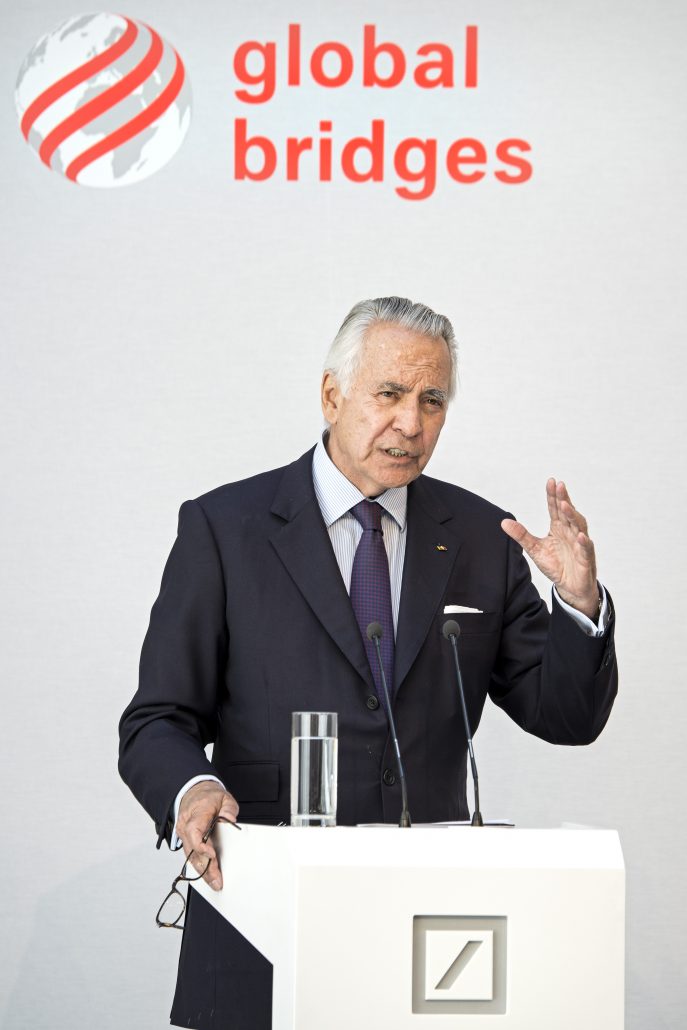 1. The scandal about Russia interfering in the election process and improper contacts from the President’s campaign team is metastasing and paralysing the administration. Trump himself has maladroitly fanned the flames that are engulfing him now. Still, it is difficult to identify a crime. But there is clearly a cover up. As a result, any meaningful, long term reconsideration of a Russia-strategy is sabotaged and blocked. All democrats are rabidly anti-Russian and a strong wing within the Republican party too (McCain). Nobody disputes, however, that even without Russian interference Clinton would have lost.
1. The scandal about Russia interfering in the election process and improper contacts from the President’s campaign team is metastasing and paralysing the administration. Trump himself has maladroitly fanned the flames that are engulfing him now. Still, it is difficult to identify a crime. But there is clearly a cover up. As a result, any meaningful, long term reconsideration of a Russia-strategy is sabotaged and blocked. All democrats are rabidly anti-Russian and a strong wing within the Republican party too (McCain). Nobody disputes, however, that even without Russian interference Clinton would have lost.
2. Trump destroys much of his initiatives through extremely bad style and vulgar taste. Shoving aside the Prime Minister of Montenegro, most recent new member of NATO, was a gratuitous insult. He failed to endorse article five, although NATO had gone to war on the strength of that article to support USA. Instead, he berated his colleagues for not spending enough, presenting a bill in a rather grotesque language.
3. Trump can be easily and successfully flattered. His visit to Saudi Arabia, the first formal cabinet meeting were most prominent examples. His unconditional commitment to Saudi Arabia has far reaching strategic consequences: USA has signed up to their policy, has given a blank cheque which could enmesh USA in never ending turmoil and confrontation in the Middle East. Some see the equivalent to another 30-years-war coming.
4. At present, there is a vacuum of power in Washington. The state department is like a ghost ship (rightfully called Foggy Bottom?). The positions of number one and two are filled, but everywhere else there is yawning emptiness. But these positions (of assistant secretary) are crucial. They provide the engine and the transmission in the execution of what has been decided on the political level.
5. Once the administration gets its act together, it should pursue the following priorities: Repair relations with Europe, particularly with Germany. Germany for the time being the only provider of strength and stability. France should be wooed. Emphasize the community of values in transatlantic links! Abandon talk about international trade being an „arena for competition“ rather than a framework for mutually profitable exchanges! Stop exporting democracy to Russia (or other countries)! Let Russians order their lives as they like! Engage Russia in those questions that are of vital importance! „We don’t care how you run your own country, but we will resolutely oppose threatening foreign behavior!“ Constructive cooperation does not imply closing your eyes to unacceptable behavior – witness our relations with the now defunct Soviet Union. In the Middle East, USA should play the role of an offshore balancer in the British tradition. Never identify completely with any of the players, but always remain present to intervene if required! USA should not be eternal friend of Saudi Arabia nor implacable foe of Iran. China is an emerging power, probably the most serious challenge to USA. It holds the greatest potential for future friction and conflict. Can we turn the Chinese into responsible stakeholders? How far does China seek to change the rules of the present international order?
Volker Rühe
Regardless of Trump, USA remains a singular friend and ally. There is the constitution, the institutions, an open, self critical society with inspiring debates. It is an integrating society that still welcomes immigrants. And even without Trump, Europe would have to do more for its own security. For serious security threats in Europe, however, USA remains the indispensable nation. Only USA can provide 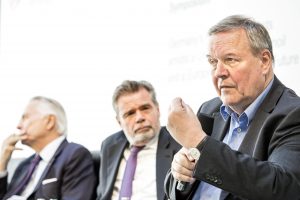 strategic reassurance. Without US support, German unification would not have been possible. Germany is still too reluctant and too timid to follow up high sounding political vows with hard military facts. The raison d’être for our armed forces is not being visited by members of parliament. The dislocation of our fighter aircraft to Jordan may have been premature. NATO enlargement was the only way forward. Russia should have been invited to join, too. Ukraine has to show that the country is serious in joining the West by fighting corruption.
strategic reassurance. Without US support, German unification would not have been possible. Germany is still too reluctant and too timid to follow up high sounding political vows with hard military facts. The raison d’être for our armed forces is not being visited by members of parliament. The dislocation of our fighter aircraft to Jordan may have been premature. NATO enlargement was the only way forward. Russia should have been invited to join, too. Ukraine has to show that the country is serious in joining the West by fighting corruption.
Rudolf Adam
Trump does not embody the United States, nor is he the true representative of the Republican Party. There are signs of growing divergences in the Senat’s decision on Russia-sanctions and reconfirmed support for NATO. Last speech of Obama in Athens: Everything in democracy is provisional and can be revised. That is the strength of democracy. Trump may turn out to be a short intermezzo in American 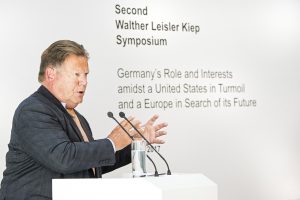 history. We should reconsider the Responsibility to Protect and War on Terrorism as concepts. They prove too often to be pretexts for unilateral interference without proper strategic concept. Terrorism calls for prevention, not police and armed forces. To combat terrorism, we have to start in education, in koran schools and madrases, in the government’s supervision of how religious leaders are trained and formed.
history. We should reconsider the Responsibility to Protect and War on Terrorism as concepts. They prove too often to be pretexts for unilateral interference without proper strategic concept. Terrorism calls for prevention, not police and armed forces. To combat terrorism, we have to start in education, in koran schools and madrases, in the government’s supervision of how religious leaders are trained and formed.
Discussion
We are not allied with the US-President. Our transatlantic alliance is based on our societies, our shared values as they are embodied in our constitutions, our common interests and the common threats to which we are jointly exposed. Even without Trump, the time would have come for Europe to take its fate into its own hands. The alliance has grown lopsided and needs urgent rebalancing. Regardless of everything, the USA remains the indispensable nation, at least for Europe and European security. It is the ultimate reassurance against vital threats. Without support from Washington, unification of Germany and unification of Europe would not have been possible. The UK remained skeptical, France showed no enthusiasm.
We need to do more for European defense, although there were sharp disputes as to how far this should go. Some postulated European statehood as an unavoidable precondition for genuine European defence, others advocated a gradual approach, focussing first on integration on those fields that are not essential for combat performance (logistics, medical services, interoperability). They argued that we should not exaggerate things. People needed reassurance in their national identities. The solution should be States of a United Europe rather than United States of Europe. From US-perspective a breakthrough to a truly European superstate would require some major political crisis. Only a severe disaster could act as catalyst for such a breakthrough. Only the catastrophe of the Second World War could have triggered the political initiative and the necessary popular support for the European Economic Union.
Already today, some essential defence instruments are no longer under national control, like e.g. AWACS.
Some were concerned about the effects of extraterritorial legislation in the USA. It seemed to be directed not only against common opponents, but equally against allies in Europe (North Stream). Some showed concern about Russia’s interference in electoral processes. Can Russia gain a stranglehold over the vital expression of political preferences in our democracies? Russia remains the central challenge for transatlantic joint political efforts. Some felt, that the Alliance had moved resolutely and successfully, but at the risk of unnecessarily provoking Russian concerns (Unilateral termination of ABM, enlargement of NATO against Russian objections, colour revolutions, European ABM-systems). NATO enlargement may have lethally weakened a nascent liberal movement in Russia. Upheavals in Ukraine were not entirely spontaneous. Victoria Nuland together with the US-ambassador in Kiew virtually picked the new Ukrainian government in 2014. China has emerged as the real big challenge. Its rise cannot be stopped.
It can only be gently guided from outside. The minimum we can do is avoid open confrontation and a series of incidents that could lead to open war. History shows that emerging megapowers usually create friction with status quo-powers that raise the risk of war (Thukydides, Peloponnesian War). Do the priorities of the new administration provide a new and wide opportunity for China to extend its influence and to fill the vacuum left by the USA? The new One Belt-One Road-initiative of China could have far reaching results and push aside US-influence at least in Central Asia.
The New Global Competition
Thierry de Montbrial
Global competition is being balanced by global interdependence. Some developments are irreversible. Even if trade flows were to be interrupted, the free flow of information and global travel would continue. Information is comparable to communicating pipes: You cannot keep the level in one pipe artificially lower than in the others. At the same time, more communication will throw difference in culture, in norms, values and social structures into higher profile. We grow closer, but we also grow more acutely aware about our differences. We lose idealized prejudices. Today, we have to ask ourselves, how far we understand radical islamists, North Koreans, Chinese, many peoples in Africa. A brief period of USA as Hyperpower has given way to true multipolarity. No single country today can impose its will on the rest of the world. There is neither universal control nor undisputed leadership. Regional power centers compete with each other. Complexity increases. Developments are not linear, unpredictability grows. We have to reckon with the butterfly-effect (A single flap of a butterfly causing a tornado). Example: Arab spring. It was started by a poor fishmonger in Tunisia committing suicide. The result was more than six years of violence and several regime changes. Todays challenge consists in keeping the world reasonably open without descending into confrontation. At the heart of the US Grand Strategy has always been the imperative to remain militarily superior to the rest of the world, against any imaginable coalition of forces.
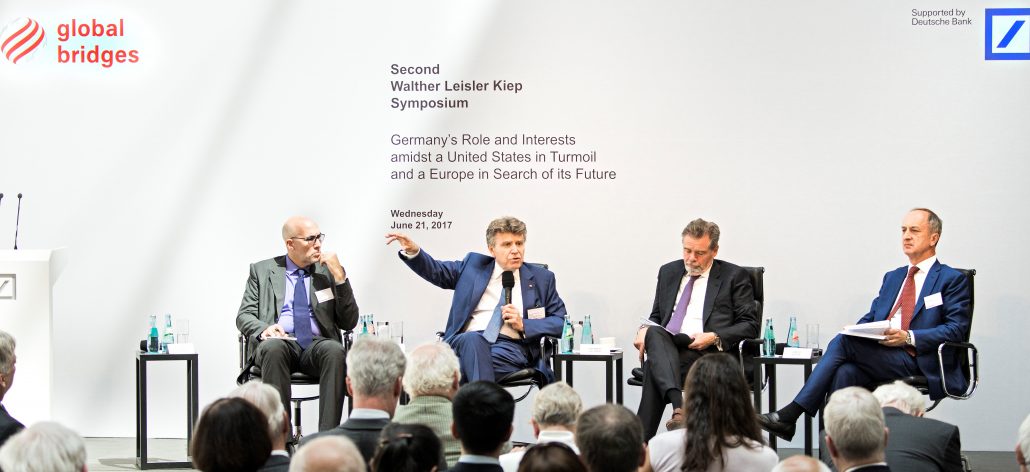
Letting Mubarak down was a serious strategic mistake. It showed to the rest of world that the USA could change its mind, drop friends and feed them to the wolves. The reputation of the USA has suffered a severe and lasting blow.
China’s rise to preeminence seems preordained. But is it? Do not discard the scenario of a major upheaval/interior crisis within China! Try to understand the preoccupation of present (and all preceding) Chinese leadership with stability in this vast country! Stability in China must be in everybody’s interest. China’s ambitions seem relatively clear: To aspire to a global top position in technology and science, to reassert regional hegemony/dominance and to acquire the capability of projecting power globally. China seeks direct access to Europe and to Africa. China has made incredible strides, but will not be rushed in this pursuits. Chinese think in decades and centuries rather than four-year-electoral cycles.
NATO committed some serious and avoidable mistakes in regard to Russia. NATO emerged victorious from the Cold War but failed to find a new relationship with the new Russian leadership. At present, mistrust and suspicions on both sides are back to Cold War-levels. Russia is no global threat. Her economic potential is equal to that of Italy, In Siberia, 40 million Russians on 10 million square kilometers face 1.300 million Chinese on 9 million square kilometers. This is the greatest challenge to Russia. Russia and Europe should get closer to each other in view of these facts rather than creating more distance between them.
Europe should be grateful to Trump and to Brexit. Suddenly there is a new awareness and appreciation for the EU. Particularly the young generation shows more support for EU. The EU is the indispensable laboratory for new forms of inter- and supranational cooperation.
We should ask some pertinent questions about the nature and health of our democracy. We believed too long and too strongly in rationality. This was our inheritance of the 60ies and 70ies. The role of emotions is growing. Democratic forces fail to manage emotions. We are proud of our principles, not of our power. We regard power as something repulsive, something bad, to be avoided.
Janusz Reiter
There is more room for optimism. Europe needs a new culture of responsibility. Poland is turning from introspection to a reassertion of a new foreign posture. The old Europe lived in the illusion of harmony. Harmony means avoiding unpleasant choices and painful dilemmas. This illusion has been shattered. The election of Trump shocked the Europeans particularly, because they had refused to believe in such a possibility. If the Pope turned atheist, it would shock all catholic believers, but not the rests of the world, particularly not the atheists.
 The old harmony within the EU has gone. Divisions, disagreements, tensions rise. The discrepancy between those who have been successful and those who failed grows. The EU was an introspective institution. It tried to distance itself from the world. It did not want a share in nasty conflicts, it neglected the military factor. Now the world comes to the EU.
The old harmony within the EU has gone. Divisions, disagreements, tensions rise. The discrepancy between those who have been successful and those who failed grows. The EU was an introspective institution. It tried to distance itself from the world. It did not want a share in nasty conflicts, it neglected the military factor. Now the world comes to the EU.
We were naive in believing Russia would embrace our values and become a country similar to the EU. Russia has her own vision of her future, which is based on a clear Russia First-principle. Russia cannot be influenced from the outside. China may not want to become a global stakeholder. And even if, it might seek substantial modification in present global arrangements and institutions.
Peter Goodman
There is good reason for optimism! The election of Trump has forced rest of the world to seek new ways of cooperation. The overall picture is less reassuring. the economic model that we pursued after World War II seems to lose its attractiveness. A growing number of people no longer feel adequately 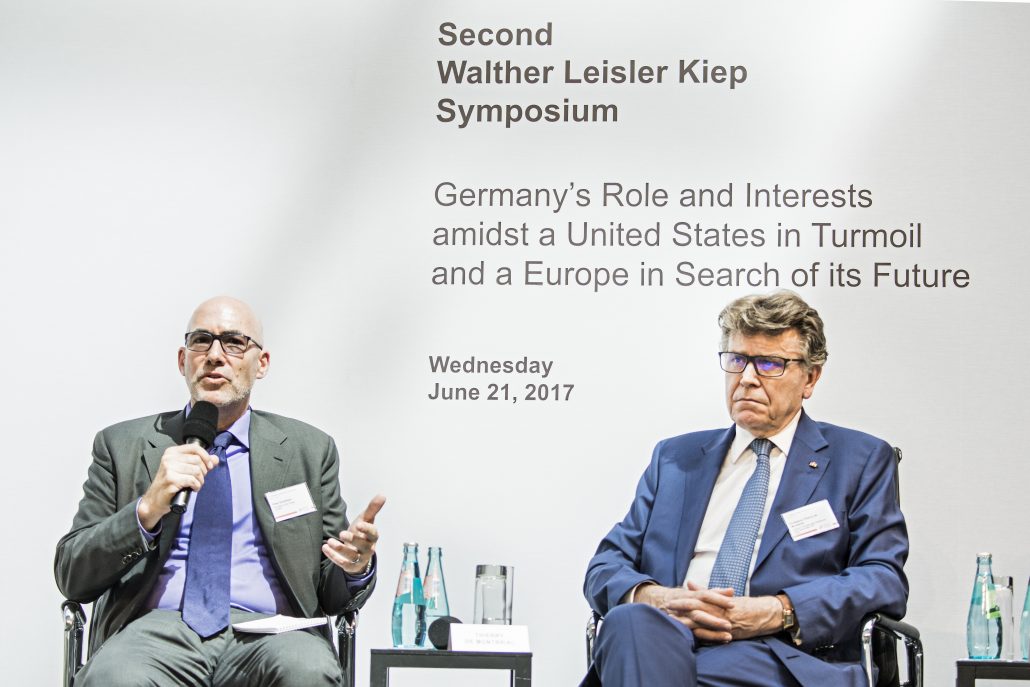 represented. There is growing impatience and dissatisfaction with the present situation. Trumps position on trade is full of contradictions. It is the simplistic zero-sum transactional model of a business man: If one side wins, the other side must necessarily lose. Trump tries to influence reality through his opinions. Facts do not seem to exist for him independently from himself. By changing their perceptions he seems to be confident he can change their nature. Tearing up the Transpacific Trade Agreement was foolish and plays only into the hands of the Chinese. If you debase facts, truth and honesty you produce the same effect as if you debase your currency.
represented. There is growing impatience and dissatisfaction with the present situation. Trumps position on trade is full of contradictions. It is the simplistic zero-sum transactional model of a business man: If one side wins, the other side must necessarily lose. Trump tries to influence reality through his opinions. Facts do not seem to exist for him independently from himself. By changing their perceptions he seems to be confident he can change their nature. Tearing up the Transpacific Trade Agreement was foolish and plays only into the hands of the Chinese. If you debase facts, truth and honesty you produce the same effect as if you debase your currency.
Discussion
The mobilization potential of the USA is still enormous and unsurpassed. At the moment, there is no social contract in the USA. Society is divided, hatred and extremism grow. USA is still best example of undiluted capitalism: cold hearted individualism. Macron is likely to reform France in that direction. Spain, Portugal and Greece have already been forced into such a transformation. China is raising its population from poverty. If 80% of Chinese population were to reach living standards of Europeans, that would amount to about 1.000 million additional consumption (and pollution) patterns.
In a world with sharpening competition, values will gain political relevance. Values are generated and transmitted by religions. Values play an important role in selecting partners whom you can trust. But we should refrain from exporting our values to other countries. We should set a good example, we should encourage others, but we should resist the temptation of forcing them to accept our model. Values are not identical with norms and rules. You can have divergent values and still agree on common standards, rules and norms. Rules and norms are bridges that can span divergent value systems. In order to establish norms and rules you need strength. Strength is a virtue, not a vice.
Germany’s Future amidst a Europe in Disarray
Ludger Kühnhardt
The EU has to complete what was begun with the Maastricht-Treaty: Finance Minister, Fiscal Union, Economic Government. The 28/27 countries remain different, compromises are necessary. We should be guided by a common purpose. Then differences will not be obstacles. 20 years ago, a powerful trio guided Europe towards today’s integration: Kohl, Mitterrand and Delors. The present trio of Merkel, Macron and Juncker has to take inspiration from them. The EU can move forward only if all member states  strictly stick to the rules and procedures agreed. The greatest weakness is empty promises, commitments not honoured, rules flouted or reinterpreted. Foreign and Security Policy is no less important. The EU has to strengthen its external borders. The EU has to find a clear distinction between migration and asylum policy. There may be up to 400 million Africans ready to migrate. They migrate not out of dire poverty, but because they are beginning to rise into a new middle class. Who migrates, usually has a mobile phone, speaks foreign languages, has a lot of information about Europe and the geographic challenges of the way. The EU today comprises 7% of global population. It produces 30% of global GDP, it accounts for 50% of global spending on social welfare. The EU uses up 40% of global resources. The EU has to become an autonomous pole in a multipolar world. Intergovernmentalism may help to contain damage and to overcome a momentary crisis. It provides no permanent institutional foundation. Supranationality and further integration along the Community Method are the only way forward.
strictly stick to the rules and procedures agreed. The greatest weakness is empty promises, commitments not honoured, rules flouted or reinterpreted. Foreign and Security Policy is no less important. The EU has to strengthen its external borders. The EU has to find a clear distinction between migration and asylum policy. There may be up to 400 million Africans ready to migrate. They migrate not out of dire poverty, but because they are beginning to rise into a new middle class. Who migrates, usually has a mobile phone, speaks foreign languages, has a lot of information about Europe and the geographic challenges of the way. The EU today comprises 7% of global population. It produces 30% of global GDP, it accounts for 50% of global spending on social welfare. The EU uses up 40% of global resources. The EU has to become an autonomous pole in a multipolar world. Intergovernmentalism may help to contain damage and to overcome a momentary crisis. It provides no permanent institutional foundation. Supranationality and further integration along the Community Method are the only way forward.
Pauline Neville-Jones
Four primary challenges confront EU and play a major role behind Brexit: The economic situation, the complex of refugees/migration/terrorism, the breakdown of the post-Cold War order and security: Russia suffers from paranoia. It would suffer regardless of what we do. Russia’s behavior leads to attrition of the Atlantic Alliance.
1. For economics, policy is more important than institutions. An EU-finance minister will entail bigger budgets, which in turn will make a transfer union almost inevitable. Economic capabilities are essential. In this, Germany as the strongest economy has to exercise leadership. EU finds itself in a crisis of trust. Inequalities increase, people vote against more EU. We have to look at developments in a dynamic way. Artificial intelligence is likely to drastically reduce job opportunities presently held by middle class people. We will need entirely new skills and qualifications. Germany could help other countries achieve this transition. The EU has no alternative than staying at the head of economic and technologic change.
2. In migration/terrorism we have to keep present level of cooperation beyond Brexit. We have quite different concepts of what integration is about. A lot of our aid policy is misdirected, including corporate and business activities.
3. 2014 the breakdown of the post-Cold War order has become evident. Germany’s reaction to events unfolding in Ukraine was shocking. The facts created by unilateral military force cannot be accepted. Values count little if you do not follow up on them and put your power resources behind them. In security, Britain continues to be open to close cooperation, as witnessed by far reaching cooperation with French navy. Europe does not have to spend more money on defence but has to use its resources more effectively.
4. In order to guide military policies we need clarity about our moral position. Europe’s place is alongside that of the USA. When we get engaged in a military mission we should see it through right to its strategic end. At the moment, we tend to slacken in our efforts as soon as elections approach.
Klaus Günther Deutsch
1. Germany is in trouble because the global economy is in trouble. Germany exports 43% of GDP. That creates high vulnerability to fluctuations in global trade.
2. Germany remain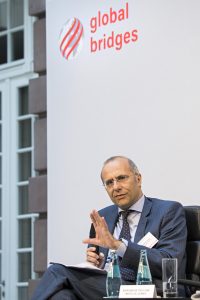 s a stabilizing influence in Europe. We now have to set the stage for the next 20 years of integration. That includes: Completion of Single Market, Banking and Fiscal Union, Defence Union.
s a stabilizing influence in Europe. We now have to set the stage for the next 20 years of integration. That includes: Completion of Single Market, Banking and Fiscal Union, Defence Union.
3. Germany has to play on two levels: Lead further integration and keep United Kingdom as close to EU as possible. It also has to fight authoritarian tendencies (Turkey, Poland, Hungary).
4. We have to keep the essence of global free trade. Wherever that is threatened it has to be supplemented with bilateral treaties. But no unilateral preferences!
5. EU has to make a better coordinated, even united effort to improve relations with immediate neighbourhood.
Discussion
Do we need efficiency checks on governments (Pisa for governments)? Politics is not about efficiency, should not imitate business models. McKinsey in government is no good idea.
Representative democracy can never be efficient. Cameron’s mistake was to resort to direct democracy in order to smooth the edges of representative democracy.
The need for further EU-integration was confirmed. Austerity should be combined with more active help by Germany for structural transformations that would increase productivity. Further to the changes suggested, the EU should bring all members into the currency union, create a European Monetary Fund. This might demand substantial treaty change.
There was a warning against fiscal union. It addresses public but not private spending. Excessive private indebtedness is more serious than public deficits. People have become accustomed to overspending. There is a dangerous asymmetry between increasing consumption and austerity. One is politically easy, the other provokes massive protests. We can reign in private consumption only through structural adjustments. They have worked in Ireland, Spain, Portugal.
Vehement contradiction that Russia’s paranoia was not prompted by the West (Kosovo, unilateral cancellation of ABM, regime changes in Afghanistan, Iraq, Libya, support for color revolutions, firm promise of NATO membership to Georgia and Ukraine). In 2014, three EU ministers stood idly by when protesters tore up an agreement which they had witnessed and confirmed the previous day. Russia’s provocations are a reaction to what it perceives as aggressive behaviors by NATO.
Concluding remarks by Friedbert Pflüger
There was remarkable agreement on the position that we should avoid imposing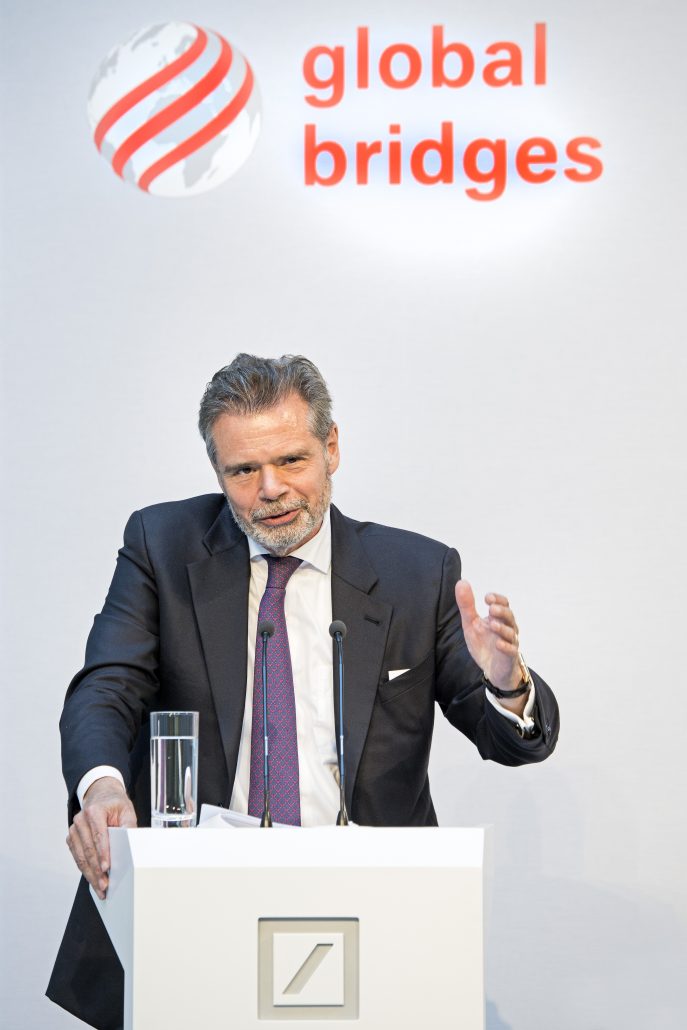 our values on others. We should set an example and stick to our convictions, but we should not engage in missionary work.
our values on others. We should set an example and stick to our convictions, but we should not engage in missionary work.
A stronger role for a united EU is needed and desirable.
The main challenger in the long run is China. The potential for friction and conflict with China is growing.
We need workable, calculable relations with Russia.
The present US administration lacks coherence and orientation. Chances that that might change are slim. We can endure one Trump, but not a succession of Trumps. Above all, we need to redouble our efforts in building bridges into this new America, to enlarge contacts with those that support Trump’s ideas.
Transatlantic Challenges off the Beaten Track
Karl-Theodor zu Guttenberg
We need to put interest and passion into our relationship with USA. Only if we preserve the essence of transatlantic relations can we contain the risks of serious divergencies or confrontation. Finger wagging and hectoring will get us nowhere.
We have to intensify our contacts with those who do not share our views. Don’t confine yourselves to New York, Washington and California! Go to those areas where Trump triumphed! They lack experience with Europe. Previously, a lot of GIs stationed in Europe came from those areas. Today, we miss them. We do share values and interests – but that should not obscure our awareness of the many differences we have.
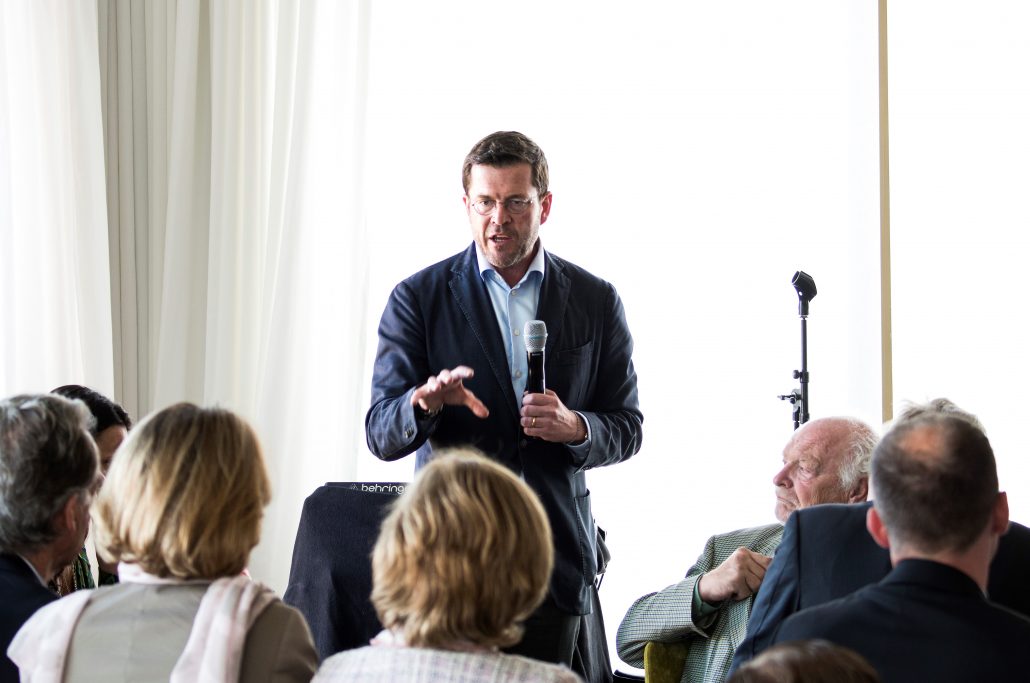
Particularly in security we have to find common approaches. For the time being we can only guess the White House’s position on Turkey and Ukraine. Do we see eye to eye with the Trump administration on Saudi Arabia and its role within the region? Simply criticizing the USA will not suffice. We have to develop better alternatives and try to influence Washington accordingly.
Germany cannot simply ignore the challenge North Korea poses to the USA. It may be a far away place, but the globe is small today and engagements in the Pacific theater necessarily weaken the US presence everywhere else. Germany is in a unique position because of our experience of unification.
USA remains a strong leader in technologic change. We should engage more actively on the future course of industry and production, on how robotics, nanotechnology, biotechnology, artificial intelligence and genomics could affect our lives. Is baby-design acceptable or not? We share common vulnerabilities in cyber security. How do we react? We should seek an understanding on these questions preferably before our paths diverge even further.
How should we react to the rise of China? In this context North Korea is but a footnote. The Chinese are moving not only with amazing clarity of vision, they move extremely fast. One Belt – One Road is going to be with us within years, not decades.
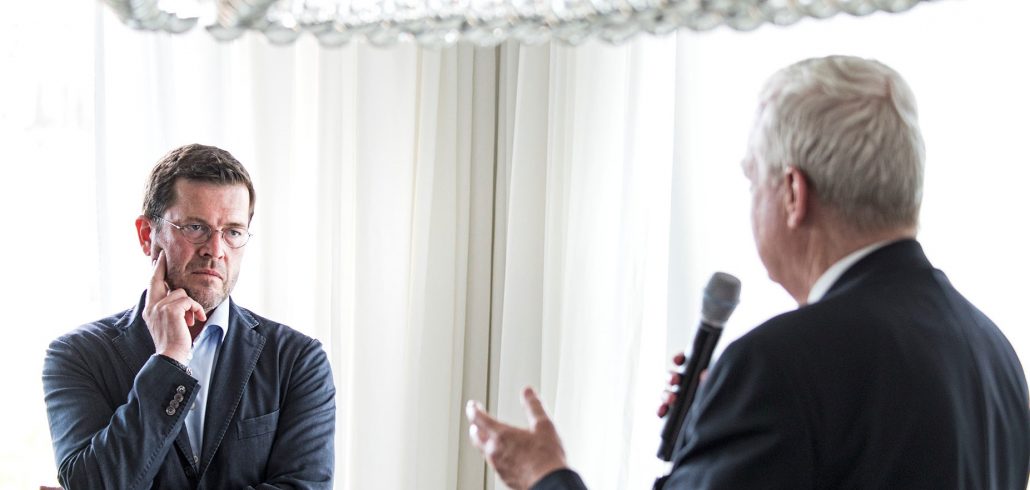
Do we have a common understanding of the tectonic changes taking place in the Middle East? How do we react to independence for Kurdistan for example?
Trust in the USA has sunk to 21% in our society – same level as towards Russia. We tend to harangue USA from the moral high ground. This can only help us drift further apart. Get the young generation into closer contact! The future is in their hands.
We should work for a further opening of relations with Iran. Terminating the nuclear deal would invite chaos. Status quo ante was definitely worse than present one. Tillerson, Mattis, McMaster all want to keep the agreement.
The imposition of new sanctions against Russia concerning North Stream is an open challenge not only to Moscow but also to Germany. We have to make these implications for Germany much clearer, because many in Washington do not see them. We cannot openly distance ourselves from Trump. But we should keep an eye on those waiting in the wings.
Frustration within the administration is unusually high. Many feel they have sunk to be a repair shop for impulsive, ill informed presidential tweets. Many good people are leaving. This increases the danger of a complete „Bannonisation“ of the White House. At the moment that prospect is still rather improbable, but even if it were to come, it would at least bring more calculability to Trump’s administration.
